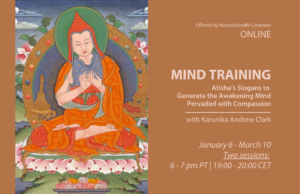Being kind is something we all have been taught since our childhood. We know it’s good to say the three magic words — Please, Thanks, Sorry — at the proper time.
Those of us who are parents or educators include this teaching as one of the pillars of social skills for our children or students. So, is being kind just common sense?
Then why did I feel so moved and inspired by Dzogchen Ponlop Rinpoche’s #GoKind teachings and social media campaign? It took me a while to realize how deeply rooted in the Buddhist tradition kindness can be. Finally, I wondered: Maybe Rinpoche’s teaching directly points out working with our ego, not just encourages being polite and well mannered.
In general, we can agree on what kindness means, but when the time comes to be kind, we usually don’t realize our ego is not buying the notion, and it starts playing tricks on us. I notice that often what I say and what my ego is really saying can be utterly different.
When we robotically pronounce the (supposedly) magic words without deeply meaning them, they sound empty, maybe even sarcastic, to the recipients, just as they sound to us when kids feel forced to say them. So maybe it’s time to learn to observe our own ego.
Here is what I see in those moments when what I say is different from what my ego means:
Please: “You need to do this, it is not a favor you are doing for me.”
Thanks: “I was forced to ask for something that you should have done without me asking.”
Sorry: “It’s your fault, but I have no time nor energy to argue with you.”
Not only are the magic words meaningless, they surely don’t produce magic for others.
Maybe this is the real difference between the good old “Be Kind” and the brand new (for me) “Go Kind.” “Go” involves an active attitude, a commitment to kindness. We can’t be passive when it comes to kindness, and we cannot play with one foot in and one foot out. To GoKind, we need to go all-in.
Then why don’t we try to flip the script?
Let’s actively transform the three magic words by thinking something like this before we say them:
“I can’t do it alone. I need help from you. I need your time” = Please
“I know you had a list of other things to do, but you chose to do this for me” = Thanks
“I was stuck on my side, I acknowledge I wasn’t even listening to you” = Sorry
This helps me to GoKind — when I’m mindful enough to realize I’m in one of those moments. When I’m not, it still helps afterwards to reflect on my motivation.
GoKind is such a profound teaching. It’s simple, it’s direct, and it’s actionable. We can bring it along on our daily journey, much like a colorful backpack, spreading the magic of kindness wherever we go.

Paolo Mazza has been a student of Dzogchen Ponlop Rinpoche since 2018, living in northern Italy. Paolo is a father of three, working in Innovation and Technology. Paolo loves hiking in the mountains and woods of the Alps.






